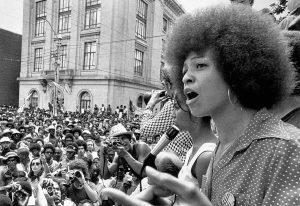For Women’s History Month, we’ll be sharing weekly blog posts from Lily Lou, one of our student interns. She will be highlighting a notable and inspiring woman in each post.
Angela Davis
Born: January 26, 1944, in Birmingham, Alabama
Occupation(s): Activist, Educator, Scholar, and Writer
Awesome Quote: “You have to act as if it were possible to radically transform the world. And you have to do it all the time.”
Why should you know about her? Angela Davis is best known for being an activist who focuses on prison abolition, gender equity, and civil rights. Her first book, Women, Race, and Class, was one of the first to focus on intersectional feminism and she is especially known for her activism in the 1970s. She ran for US vice president on the Communist Party ticket in 1980 and 1984, encouraging more African Americans to join the Party. Her activism started as a graduate student: she was politically active in groups including the Black Panthers and the Che-Lumumba Club, an all-black branch of the Communist Party. She also co-founded Critical Resistance, an organization working to abolish the prison-industrial complex, especially addressing the disproportionately high number of minorities in prisons. In 1969, she taught at the University of California, Los Angeles despite facing controversy from the University’s administration because of her involvement in the Communist Party. She later taught courses on the history of consciousness and chaired the feminist studies department at the University of California, Santa Cruz before retiring in 2008. She has written five books including Angela Davis: An Autobiography, Women, Race, and Class and Blues Legacies and Black Feminism: Gertrude “Ma” Rainey, Bessie Smith, and Billie Holiday.
Brief Biography: Angela Davis grew up in Birmingham, Alabama with two brothers and a sister. Her mother was a part of the NAACP and worked as an elementary school teacher. Her father owned a service station. Davis attended a segregated black elementary school and middle school. In high school, Davis set up interracial study groups, which were frequently broken up by police. As a high school junior, Davis moved to New York as part of a program that placed black students from segregated schools in the South in progressive, schools in the North.
In 1961, she went to Brandeis University, where she graduated with honors (magna cum laude) and earned a B.A. in French literature. In 1963, she was studying abroad in France, when she found out about the Ku Klux Klan bombing a Birmingham church, killing four girls she knew. This attack inspired her to return to the U.S. and become more politically active in fighting for civil rights. After graduating, Davis joined the Student Nonviolent Coordinating Committee (SNCC) and later the Black Panther Party.
After studying philosophy for two years at the University of Frankfurt in Germany, she went to University of California at San Diego in 1968 to pursue a master’s degree. She later earned her Ph.D. from Humboldt University in Berlin.
From 1969 to 1970, Davis was an assistant professor of philosophy at the University of California at Los Angeles, but because she was part of the Communist Party, many administrators opposed her teaching.
In the 1970s she began pushing for changes in the prison system. Davis was arrested in 1970 after a prison abolitionist, Jonathan Jackson, tried to free prisoners on trial using guns registered in her name. In a court room, four people, including one judge, were killed during the incident, but Davis was acquitted on all charges. The incident, however, led to more opposition against her teaching in California colleges. However, in 1977, Davis became a lecturer in women’s and ethnic studies at San Francisco State University in 1977.
She also ran as vice president for the Communist Party in the U.S. elections of 1980 and 1984. As the candidate, she wanted to make the Communist Party more accessible to the African American community. In 1984, she began teaching the History of Consciousness and Feminist Studies at the University of California at Santa Cruz and Women’s and Gender Studies at Syracuse University, eventually becoming the chair of the feminist studies department. She retired in 2008, but continues to advise students and occasionally teaches classes at UC Santa Cruz.
